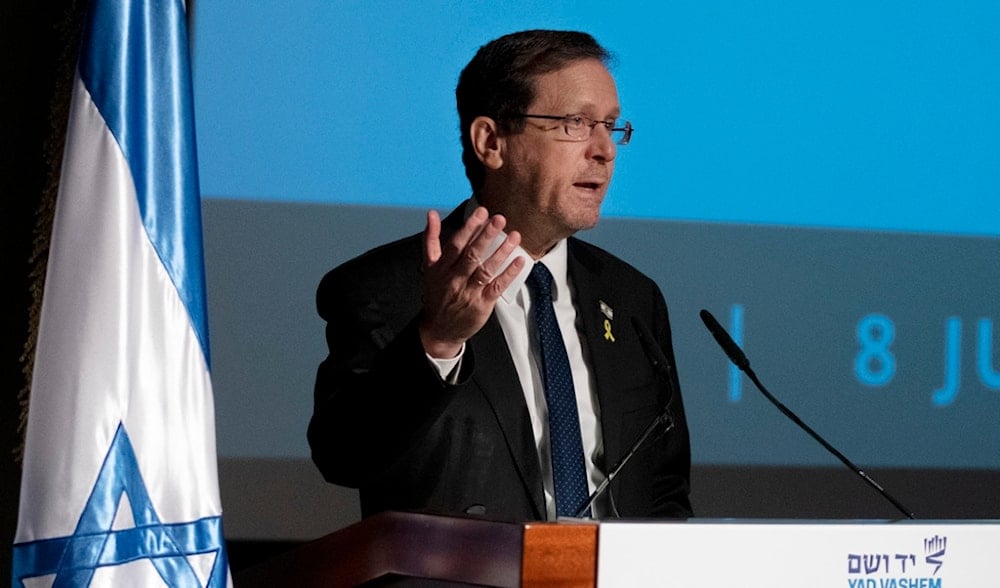While Herzog seeks deal, Netanyahu asserts military pressure policy
As tensions escalate on the regional plateau, the Israeli occupation's officials seem to be more divided than ever over how to achieve their goals.
-

Israeli occupation President Isaac Herzog speaks in al-Quds, occupied Palestine, July 8, 2024. (AP)
Speaking at the "State Memorial Ceremony," Israeli President Isaac Herzog and Prime Minister Benjamin Netanyahu spoke of two contradictory plans to reach a prisoner exchange deal with the Resistance.
While Herzog emphasized the need to reach a deal quickly to return Israeli captives being held in the Gaza Strip, Israeli occupation Prime Minister Benjamin Netanyahu argued that "only increasing military pressure" against the Palestinian Resistance will "lead to the achievement of all the war’s goals — including the return of all our hostages home, both the living and the dead."
Moreover, Netanyahu acknowledged that the Axis of Resistance seeks to hold "Israel" in a "stranglehold" and claimed that "anyone who harms us will pay a very heavy price."
Herzog also referenced the Axis of Resistance, noting that the internal Israeli strife, which has deepened since the launch of Operation Al-Aqsa Flood and has become evident through the contradictory approaches to ending the war between the prime minister and other Israeli officials, is "a strategic gain for them [the Axis]."
Netanyahu's latest assassinations another snub, disregard to Biden admin
The assassination of the head of Hamas' political bureau in Iran, Ismail Haniyeh, has put more strains on relations between the Biden administration and the Israeli prime minister, noted Patrick Wintour, diplomatic editor at The Guardian, in a recent article.
A week ago, while standing with Donald Trump in Florida, Benjamin Netanyahu was vague on the latest prospects of a ceasefire in Gaza, as per Wintour. "I hope we are going to have a deal. Time will tell," Netanyahu remarked, shortly after his contentious address to a joint session of the US Congress.
During his three-day visit to the US, Netanyahu carefully avoided making any firm commitments to the ceasefire plan proposed by Biden on May 31.
Meanwhile, reports indicated that the US administration was exerting strained efforts to secure Netanyahu's commitment to a permanent ceasefire. Reports now indicate that while Netanyahu was publicly discussing the potential for a deal, a plan to assassinate the head of Hamas' political bureau in Iran was already set. Shortly after Ismail Haniyeh, the senior Hamas leader was assassinated on Wednesday night.
In Wintour's view, the potential repercussions of Haniyeh's assassination were evident to everyone. The Qatari prime minister, Sheikh Mohammed bin Abdulrahman al Thani, expressed frustration and accused Netanyahu of undermining the peace process. "How can mediation succeed when one party assassinates the negotiator on the other side?" he questioned.
According to observers, as cited by Wintour, the assassination undermines the US position, leaving it to look like the "junior partner" in the US-Israeli duo.
Matt Duss, a former foreign policy advisor to Bernie Sanders, said, “It is another case of Netanyahu putting up two fingers to Biden. There has been month after month after month of these just repeated affronts and humiliations from Netanyahu, culminating in this ridiculous moment last week, where he came and spoke in front of Congress yet again, to undermine Biden’s ceasefire proposal. Yet Biden, who sets such store by personal relations, refuses to change course.”
Duss has criticized Biden for not using control over US weapon supplies as leverage with "Israel", allowing Netanyahu to continue the war without constraints.
Read more: Netanyahu allegedly greenlit Cairo talks after Haniyeh assassination

 3 Min Read
3 Min Read








